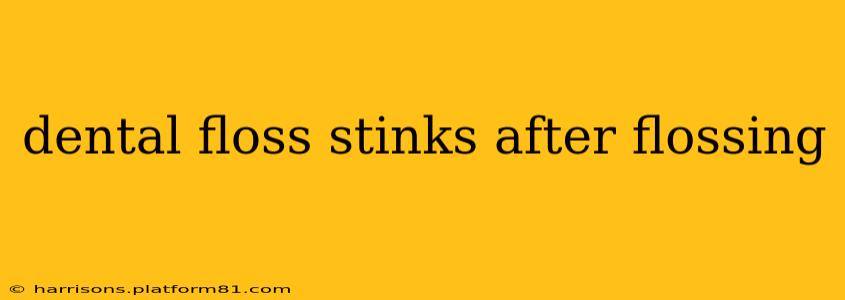Many people diligently floss their teeth, only to be met with a surprising and unpleasant outcome: bad breath. While flossing is crucial for oral hygiene, the resulting odor can be disconcerting. This isn't necessarily a sign that you're doing something wrong; rather, it highlights the complex interplay between bacteria, food particles, and your oral health. Let's delve into the reasons why your breath might stink after flossing and how to address this common concern.
Why Does My Breath Smell After Flossing?
This is the central question many people ask. The answer isn't a simple one, as several factors contribute to post-flossing halitosis. Essentially, flossing disrupts the bacterial colonies living between your teeth, releasing volatile sulfur compounds (VSCs) – the primary culprits behind bad breath. These compounds are produced as bacteria break down food particles trapped in the tight spaces your toothbrush can't reach. Flossing removes these particles, but the process itself can temporarily release the already-present VSCs into your mouth, leading to a foul odor.
What Causes Bad Breath After Flossing?
Several factors contribute to the unpleasant smell:
-
Bacteria: The primary cause is the anaerobic bacteria thriving in the spaces between your teeth. These bacteria produce VSCs, notably hydrogen sulfide and methyl mercaptan, which are responsible for the characteristic rotten-egg smell.
-
Food Particles: Trapped food particles provide a feast for these bacteria, exacerbating the production of VSCs. The act of flossing removes these particles, but the release of the already-present byproducts is inevitable.
-
Gum Disease: If you have gingivitis or periodontitis, flossing may dislodge infected tissue and bacteria, leading to a more pronounced bad breath.
-
Poor Oral Hygiene: Insufficient brushing and infrequent flossing allows bacterial colonies to grow unchecked, resulting in a heightened release of VSCs during flossing.
-
Medical Conditions: In rare cases, underlying medical conditions can contribute to persistent bad breath, even after flossing. These conditions may require medical attention.
How Can I Prevent Bad Breath After Flossing?
Addressing post-flossing bad breath involves a multifaceted approach:
-
Thorough Brushing: Brush your teeth twice a day for at least two minutes each time, using fluoride toothpaste. This removes surface bacteria and food particles before you floss.
-
Proper Flossing Technique: Gently guide the floss between your teeth, curving it around each tooth in a "C" shape to reach below the gumline. Avoid snapping or forcing the floss, which can irritate gums.
-
Mouthwash: Rinsing your mouth with an antimicrobial mouthwash after flossing can help neutralize VSCs and reduce bacteria. Look for mouthwashes containing chlorhexidine or essential oils.
-
Regular Dental Checkups: Visit your dentist regularly for professional cleanings and checkups. Early detection and treatment of gum disease are crucial in managing bad breath.
-
Hydration: Drinking plenty of water helps wash away food particles and bacteria.
-
Dietary Changes: Certain foods, like garlic and onions, can contribute to bad breath. Limiting their consumption can help.
-
Tongue Cleaning: Use a tongue scraper to remove bacteria from the surface of your tongue, a significant source of bad breath.
Is Bad Breath After Flossing a Sign of Gum Disease?
While bad breath after flossing isn't automatically a sign of gum disease, it can be a contributing factor. If you experience persistent bad breath, bleeding gums, swollen gums, or receding gums alongside the post-flossing odor, it's crucial to schedule a dental appointment. These symptoms could indicate gingivitis or periodontitis, requiring professional treatment.
Why Does My Breath Still Smell Bad Even After Brushing and Flossing?
If you're still experiencing bad breath despite diligent brushing and flossing, several other factors could be at play:
-
Dry Mouth: Saliva helps neutralize acids and wash away food particles. Dry mouth can exacerbate bad breath.
-
Underlying Medical Conditions: Certain medical conditions, such as diabetes or chronic respiratory infections, can contribute to persistent bad breath. Consult your doctor if you suspect this might be the case.
-
Smoking: Smoking significantly increases the risk of gum disease and contributes to persistent bad breath.
How Often Should I Floss?
The American Dental Association recommends flossing at least once a day, ideally before brushing at night.
Addressing post-flossing bad breath is about optimizing your overall oral hygiene routine. By incorporating these strategies, you can enjoy the benefits of flossing without the unpleasant surprise of bad breath. If concerns persist, consult your dentist for personalized advice and treatment.
